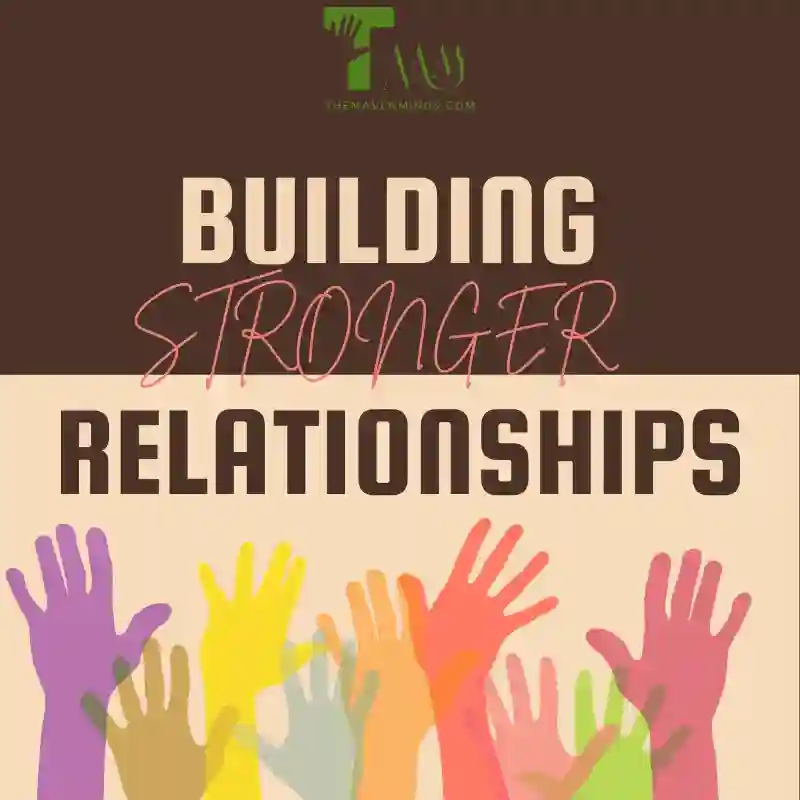BUILDING STRONGER RELATIONSHIPS
Whether it’s with friends, family, or coworkers, building strong relationships is an essential part of our personal and professional lives. Strong relationships provide a sense of belonging, support, and trust that can help us overcome challenges and achieve our goals. In this article, we’ll explore some tips and strategies for building stronger relationships with those around us.
. Understanding the Importance of Relationships:
Before we dive into the strategies, it’s important to understand why relationships are so crucial. Relationships are fundamental to our joy and well-being. They provide us with a sense of purpose, belonging, and social support. People who have strong relationships are generally happier and healthier than those who are socially isolated.
. Building Strong Relationships with Friends and Family:
Friends and family are the most important relationships we have in our lives. Here are some tips for building stronger relationships with them:
1. Communicate Effectively:
Communication is the foundation of any healthy relationship. To build stronger relationships with friends and family, it’s important to communicate openly and honestly. Listen actively, show empathy, and be willing to compromise.
2. Spend Quality Time Together:
Spending quality time with loved ones is a great way to strengthen your relationship. Make time for regular activities together, such as dinners, movies, or outdoor adventures. Try new things together and create shared experiences that you can cherish.
3. Show Appreciation and Gratitude:
Don’t take your loved ones for granted. Make an effort to show them how much you appreciate and value them. This can be as simple as saying “thank you” or sending a thoughtful message or gift.
Building Strong Relationships with Coworkers and Colleagues:
Strong relationships with coworkers and colleagues can improve your job satisfaction and help you achieve your career goals. Here are some tips for building stronger professional relationships:
1. Be a Good Listener:
Effective communication is just as important in the workplace as it is in personal relationships. Practice active listening and be open to feedback from your colleagues. This will help you build trust and respect in the workplace.
2. Collaborate and Cooperate:
Collaboration is key to building strong professional relationships. Seek out opportunities to work with your colleagues and offer your assistance when needed. Cooperate with others to achieve shared goals and recognize and celebrate their contributions.
3. Show Empathy and Understanding:
Be mindful of your colleagues’ needs and perspectives. Show empathy and understanding when they’re facing challenges and be willing to offer support and assistance.
Overcoming Challenges in Building Strong Relationships:
Building strong relationships isn’t always easy. Here are a few typical difficulties you might encounter and potential ways to overcome them:
1. Address Conflicts Head-On:
Conflicts are a natural part of any relationship. When conflicts arise, address them head-on and try to find a solution that works for everyone. Avoiding conflicts will only make the situation worse.
2. Manage Expectations:
Managing expectations is key to building strong relationships. Be clear and realistic about what you can and cannot do, and be willing to compromise when needed.
3. Practice Forgiveness:
Forgiveness is essential to building strong relationships. Let go of grudges and resentments and work towards a more positive and forgiving mindset.
Conclusion
Building strong relationships takes effort and dedication, but the benefits are well worth it. By following these tips and strategies, you can strengthen your relationships with loved ones and colleagues, improve your job satisfaction and achieve your personal and professional goals.
FAQs
- What if I’m having trouble communicating with someone?
If you’re having trouble communicating with someone, try to approach the situation with an open mind and a willingness to listen. You may want to think about getting assistance from a mediator or therapist.
- What if I don’t have time to spend with loved ones?
Developing meaningful relationships with important people in your life requires prioritizing and investing time in them. Even if you have a busy schedule, try to carve out some time each week for a quick phone call or video chat, or schedule a regular activity that you can do together.
- How can I build stronger relationships with people I don’t know very well?
Building relationships takes time and effort, but there are some simple things you can do to start. Try initiating a conversation with someone new, asking them about their interests or experiences. Look for shared interests or common ground that can help you connect on a deeper level.
- What if I’m dealing with a particularly difficult person?
Dealing with difficult people can be challenging, but it’s important to remain calm and professional. Try to see things from their perspective and focus on finding a solution that works for everyone. If the situation becomes too toxic or damaging, it may be necessary to set boundaries or seek help from a professional.
- How can I maintain strong relationships over time?
Maintaining strong relationships requires ongoing effort and commitment. Make an effort to stay in touch regularly, show appreciation and gratitude, and be willing to adapt and evolve as your relationship grows and changes. Remember that relationships require patience, empathy, and understanding, but the rewards are well worth it.
in summarize Building stronger relationships takes effort and time, However, the benefits make the effort and investment worthwhile. By prioritizing the people who matter most to you, being present and engaged in your interactions, and showing appreciation and empathy, you can create deeper, more meaningful connections that Improve your own life and enhance the lives of those in your vicinity.
Remember that building stronger relationships is an ongoing process, and it requires ongoing effort and commitment. But with patience, empathy, and a willingness to adapt and grow, you can create relationships that are strong, resilient, and fulfilling.

